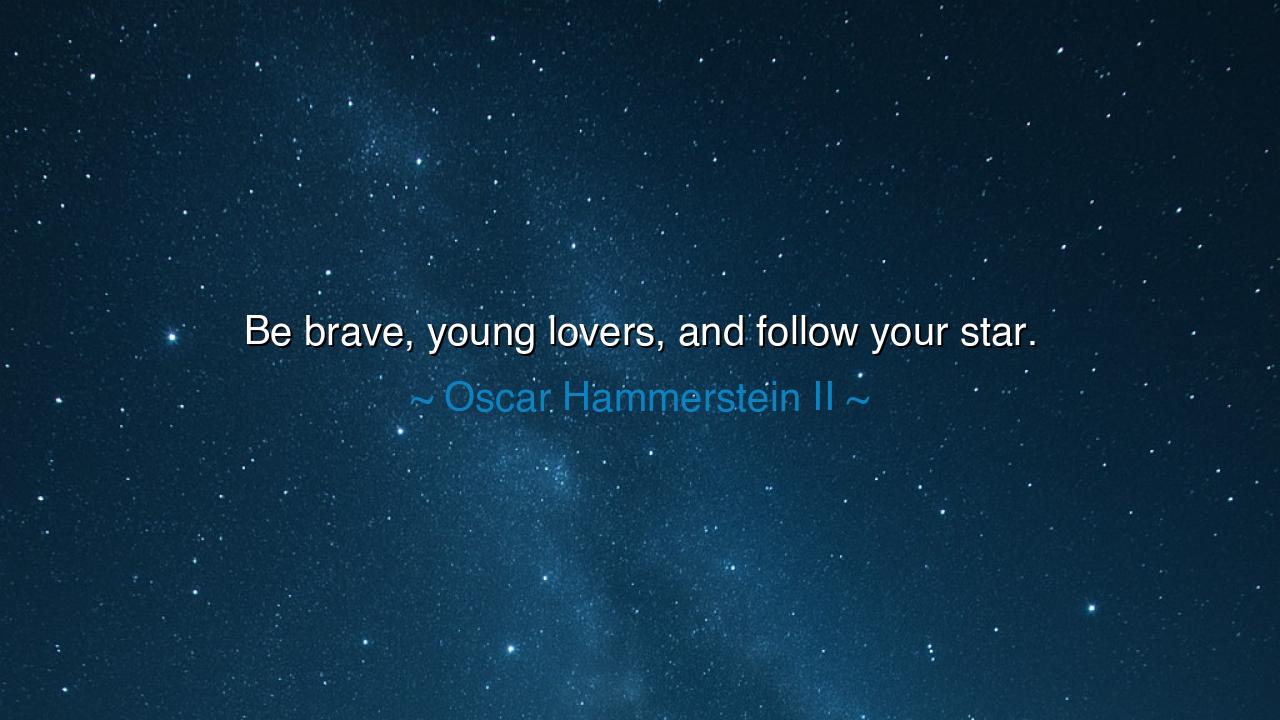
Be brave, young lovers, and follow your star.






Oscar Hammerstein II, master of song and story, once proclaimed: “Be brave, young lovers, and follow your star.” These words, though born in the world of musical theater, bear the weight of ancient wisdom. For in them lies the eternal command: that those who love must not cower before the judgments of the world, nor shrink before the storms of circumstance, but must walk boldly toward their destiny. To be brave is the first condition of true love, for love, like the star, is a guiding light that asks for trust, sacrifice, and faith.
The origin of this teaching arises from Hammerstein’s life and art. He wove stories where love defied tradition, prejudice, and fear, and in his music, he gave voice to the courage of the heart. In Carousel, in South Pacific, in The Sound of Music, he showed that to love is to risk, to face opposition, and to follow not the path laid out by others, but the shining course written in the heavens for two souls. Thus, his call to young lovers is also a call to all who would live authentically: dare to follow the star within, even if the world resists.
Consider the tale of Abelard and Heloise, whose love in medieval France defied the conventions of their age. They suffered greatly for their union, enduring separation and sorrow. Yet even in tragedy, their story has endured as a testament to courage. They followed their star, even when it led them into darkness, because to deny their love would have been to deny their very souls. Their lives reveal Hammerstein’s wisdom: that the brave may suffer, but the cowardly in love never truly live.
Think also of Mahatma Gandhi and Kasturba, who together walked the star-lit path of truth. Though their love was tested by exile, imprisonment, and relentless struggle, they remained companions in courage. Gandhi’s devotion to nonviolence and justice was not his alone—it was strengthened by Kasturba’s steadfast heart. Together, they showed that love is not merely a private flame but a guiding star that can light the way for nations. Their story teaches us that bravery in love does not end in the home; it radiates outward, transforming the world.
The deeper meaning of Hammerstein’s call is that love without bravery is fragile. The young who shrink from sacrifice may dream of love but never taste its fullness. The world will test lovers with disapproval, distance, hardship, and temptation. Only the brave will endure, clinging to their star even when clouds cover the sky. The star is the symbol of destiny, hope, and divine guidance; to follow it is to believe that love itself is sacred, worth every risk, and capable of leading to greatness.
The lesson, O children of tomorrow, is clear: do not fear the path your heart reveals. If your love is true, it will demand courage. Be willing to stand against the mockery of others, the walls of tradition, and the trials of life. Love is not for the timid—it is for those who will risk loss, who will choose vulnerability, who will place their trust in the star that shines above all fear. To live otherwise is to wander in darkness, never knowing the radiance of a love fully pursued.
Practical wisdom follows: each day, choose bravery in your love. Speak words of affection when silence seems safer. Stand beside your beloved in the face of opposition. Build a life not according to the doubts of others, but according to the truth you both discern. Let your love be guided not by fear, but by faith in the star that brought you together. In this way, you will not only find joy, but you will live as torchbearers for those who come after.
Thus Hammerstein’s words, though sung upon the stage, endure as prophecy: “Be brave, young lovers, and follow your star.” For in the end, it is not the safe, the timid, or the calculating who write the stories that last—it is the brave, who dared to love greatly, and by their courage, found eternity in each other’s arms.






AAdministratorAdministrator
Welcome, honored guests. Please leave a comment, we will respond soon